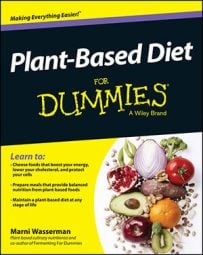You need to consume a number of fats on a daily basis from a wide variety of sources. The nutrition they provide is essential to your body and your health.
Essential fats
Essential fats, otherwise known as fatty acids (EFAs), are fats that your body needs but are unable to manufacture. Therefore, you must get them from dietary sources. These fats fall into two groups, omega 3 and omega 6, which are made up of both mono- and polyunsaturated fats.
Omega-3 fatty acids are vital to the development of a child’s brain and nervous system and for the maintenance and repair of the adult brain and nervous system; they’re also anti-inflammatory. In the plant-based world, omega-3 EFAs are found in leafy greens, walnuts, chia seeds, and flaxseeds. Lack of omega-3 fatty acids can result in behavioral and learning disorders.
On average, you should consume one or two tablespoons of oil or seeds per day, or a few walnuts.
Omega-6 fatty acids can be helpful to many inflammatory conditions and diseases. In the plant-based world, they’re readily available in avocados, grain products, nuts, seeds, and many commonly used cooking oils, such as sesame, safflower, and sunflower.
On average, you should consume 1/4 avocado, 1/4 cup of nuts or seeds, or one to two tablespoons of one of these cooking oils per day.
The tricky thing about EFAs is that most people get enough in their diet already, but they come from the wrong sources, such as products made with refined sugars and trans fats. This can actually be pro-inflammatory.
An overall imbalance between omega 3 and omega 6 can contribute to any of the following conditions: heart attack, stroke, cancer, obesity, insulin resistance, diabetes, asthma, arthritis, lupus, depression, schizophrenia, attention-deficit disorder, postpartum depression, Alzheimer’s disease, chronic inflammatory disorders, and reduced cellular detoxification.
Your body also needs omega 9, but it’s considered nonessential because your body can synthesize this fat on its own. You don’t have to depend on dietary sources to obtain it. Olive oil is the most known source of omega 9, so keep it on hand at home for an extra boost — assuming that it’s extra-virgin olive oil and that you use it in moderation.
Fats to avoid
The main group of fat to avoid entirely is trans fatty acids (TFAs). This is difficult because many processed foods are laden with them, but TFA consumption is linked to heart disease and elevated cholesterol levels.
Also, TFA impairs lipoprotein receptors (the place where cholesterol binds) and your body’s ability to process low-density cholesterol (otherwise known as LDL, or “bad” cholesterol), which eventually elevates LDL levels in the blood. This is generally considered to be unhealthy.
Not all vegetable oils are healthy!
When LDL and total cholesterol levels are elevated, many doctors tell people to restrict animal fats, butter, cheese, and eggs, which is appropriate advice. However, they suggest replacing butter with margarine — this makes the problem worse!
Margarine is a vegetable-oil-based product designed to compete with butter in the marketplace. It’s notorious for high levels of TFAs! Margarine is pretty much one molecule away from plastic. Do you want that in your body?
Steer clear of these bad boys:
Commercially baked pastries, cookies, doughnuts, and cakes
Packaged snack foods (for example, popcorn, crackers, and chips)
Vegetable shortening
Fried foods
Candy bars
Watch out for hidden forms of fat like lard that are animal-based.

